Melinda Haring
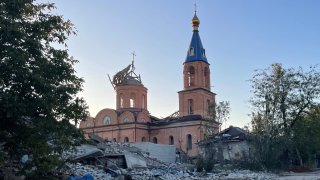
Each time we hop in the grey SUV in Zaporizhzhia, Ukraine, the French battle cry “La Marseillaise” blasts from the radio.
Michael Sushko, an advisor to the Zaporizhzhia governor and my driver, grins and winks as he tears down the city’s main drag. Zaporizhzhia, a sleepy industrial city, sits one hour from the front and serves as a jumping-off point for Ukraine’s soldiers.
There are signs of war everywhere. At least three military supply stores dot the main street, and there’s visible damage to hotels, residential buildings, and factories.
Russia occupies almost seventy percent of the Zaporizhzhia region, but as I discovered during a recent visit, the locals remain defiant and utterly determined to retake their land. Fierce battles continue to rage across the Zaporizhzhia region as Ukraine attempts to seize its lands in a counteroffensive that began in June.
My Visit to Ukraine
To gain a better understanding of the Ukraine war, I traveled to the front together with Andrey Liscovich. Liscovich was described in early October in Wired as “a Victorian with an iPhone” and an integral part of a new “military-retail complex” that seeks to supply Ukraine with consumer-grade tech. I was fortunate to have this savvy entrepreneur as my guide. We traveled to the region on an overnight train from Kyiv. Upon arriving at the station, where local police methodically checked passports, we got caught up in a large crowd.
Despite his status as an informal advisor to Ukraine’s General Staff, Liscovich was concerned about being searched. The local police asked him if he was married. He shook his head, changed the subject, and pointed to my US passport, which seemed to help. There are countless videos of men being mobilized at train stations in provincial cities while life in Kyiv continues unchanged.
When the war started in February 2022, Liscovich, 38, was living in San Francisco and close to launching a new startup. On February 26, the former tech CEO boarded a flight, walked across the Polish-Ukrainian border, and took a series of buses, trains, and even hitchhiking to travel to his boyhood home. His parents were evacuating, moving west, while he was moving east but they were unaware of his movements.
After arriving in Zaporizhzhia, Liscovich tried to enlist, but he was rejected. With his Harvard PhD, he was deemed too valuable to send into combat. Instead, he was tasked with solving the region’s serious supply chain shortages. The guys who were volunteering wore track pants and athletic shoes and were not ready for war. So the bulky businessman of Ukrainian Jewish heritage did what he does best: organize and build a team.
At its height, the Ukraine Defense Fund, Liscovich’s NGO, had thirty volunteers coordinating logistics and raising money. Liscovich was the only one in Ukraine. “I have never worked harder,” he recalled. Indeed, Liscovich went into overdrive, sleeping 2-3 hours every night during March 2022.
Altogether, he has brought in more than $100 million in non-lethal assistance to “speed up the kill chain,” a phrase Liscovich never tires of repeating. Non-lethal aid is everything that doesn’t go boom, and it increases the lethality and efficacy of Ukraine’s armed forces.
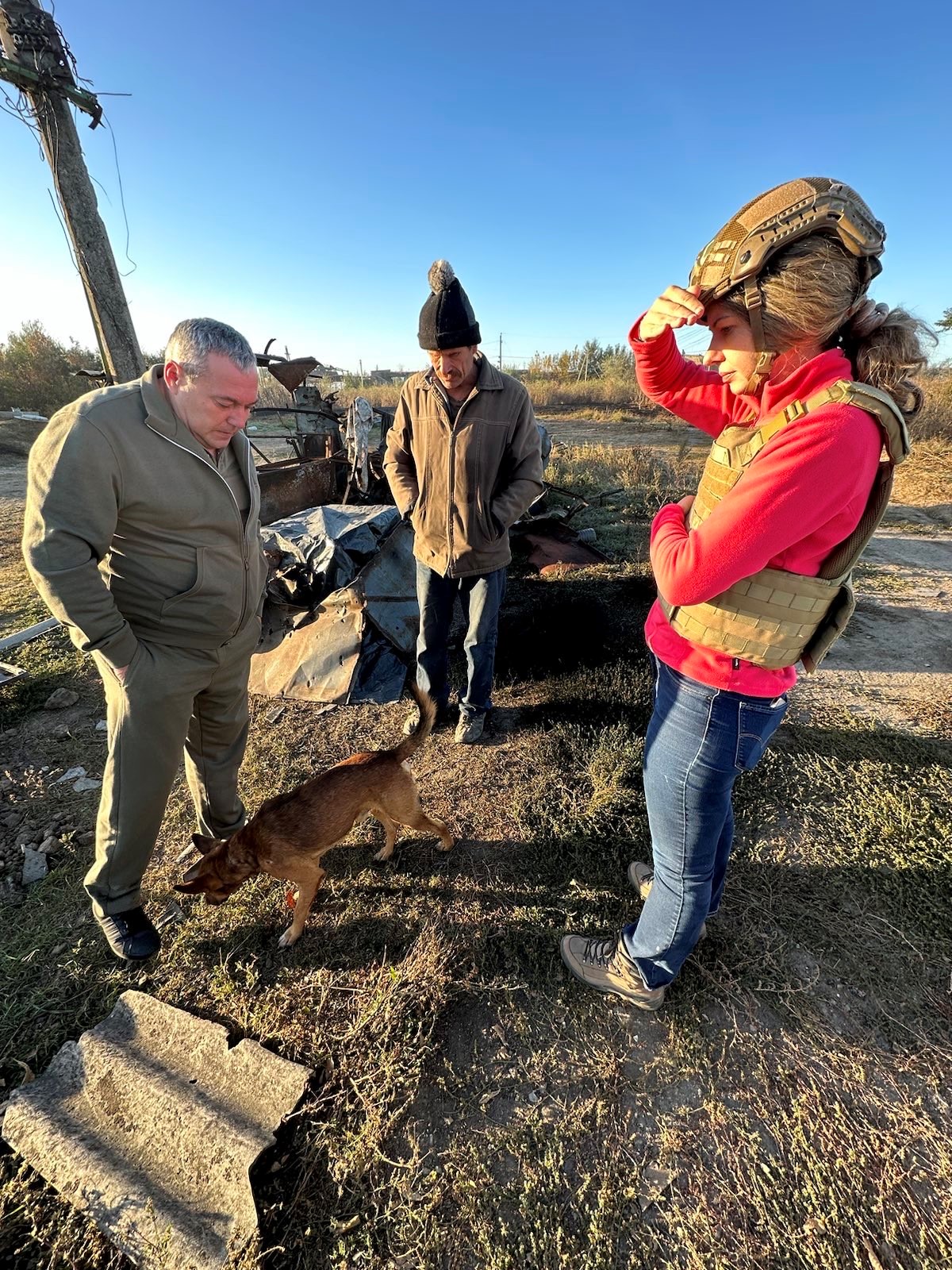
Mykola Vinnichenko, head of the Orikhiv military administration, inspects the city well that provides 1,200 remaining civilians with fresh drinking water. Two people were recently killed at the well.
The office of Ukraine Defense Fund, or “the campus,” as Liscovich calls it with its corrugated metal siding, looks more like my storage facility in suburban DC than the headquarters of one of the most important NGOs in Ukraine. From the bare room, one can see the Ukrainian flag flying over the local regional headquarters and pollution billowing from Zaporizhzhia’s metallurgical plants. It would be difficult to find a less inspiring view or one more dissimilar from his digs in San Francisco.
When Zaporizhzhia came under heavy missile fire, Liscovich decamped to a small village and slept on a couch in a wine cellar, giving interviews and coordinating the delivery of supplies. Mice kept him company.
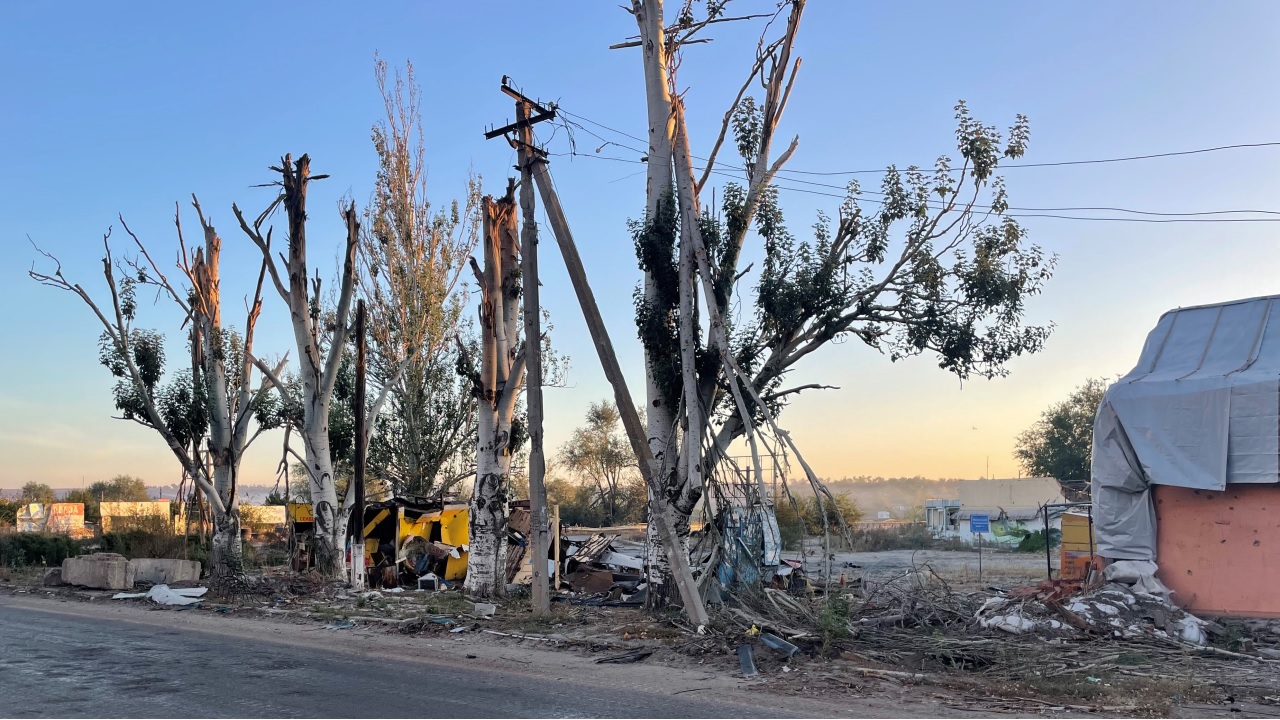
Russia destroyed the bus station in Orikhiv, Ukraine.
Liscovich embodies the low-key tenacious spirit of this otherwise utterly forgettable city in eastern Ukraine. I saw this attitude again and again. When I asked Ruslan Movchan, deputy head of the Zaporizhzhia region, what plans and programs he had in mind to keep people’s spirits up during another long winter, he looked at me like I was barking mad. “We don’t need that stuff,” he said. What they need are large tents as well as bomb shelters for schools.
In the Zaporizhzhia region, schools remain closed, and children are taught online. Movchan hopes to reopen schools in a hybrid format in January if security conditions allow and the regional government can build sufficient bomb shelters. He estimates that the region needs no fewer than 100. Worst case scenario, Movchan is preparing for 2-3 weeks of blackouts this winter. He worries less about the Russians hitting the city’s dam or a mistake at the Zaporizhzhia nuclear power plant than about the slow pace of the counteroffensive. He expects the Ukrainian side to liberate three more settlements in the coming weeks.
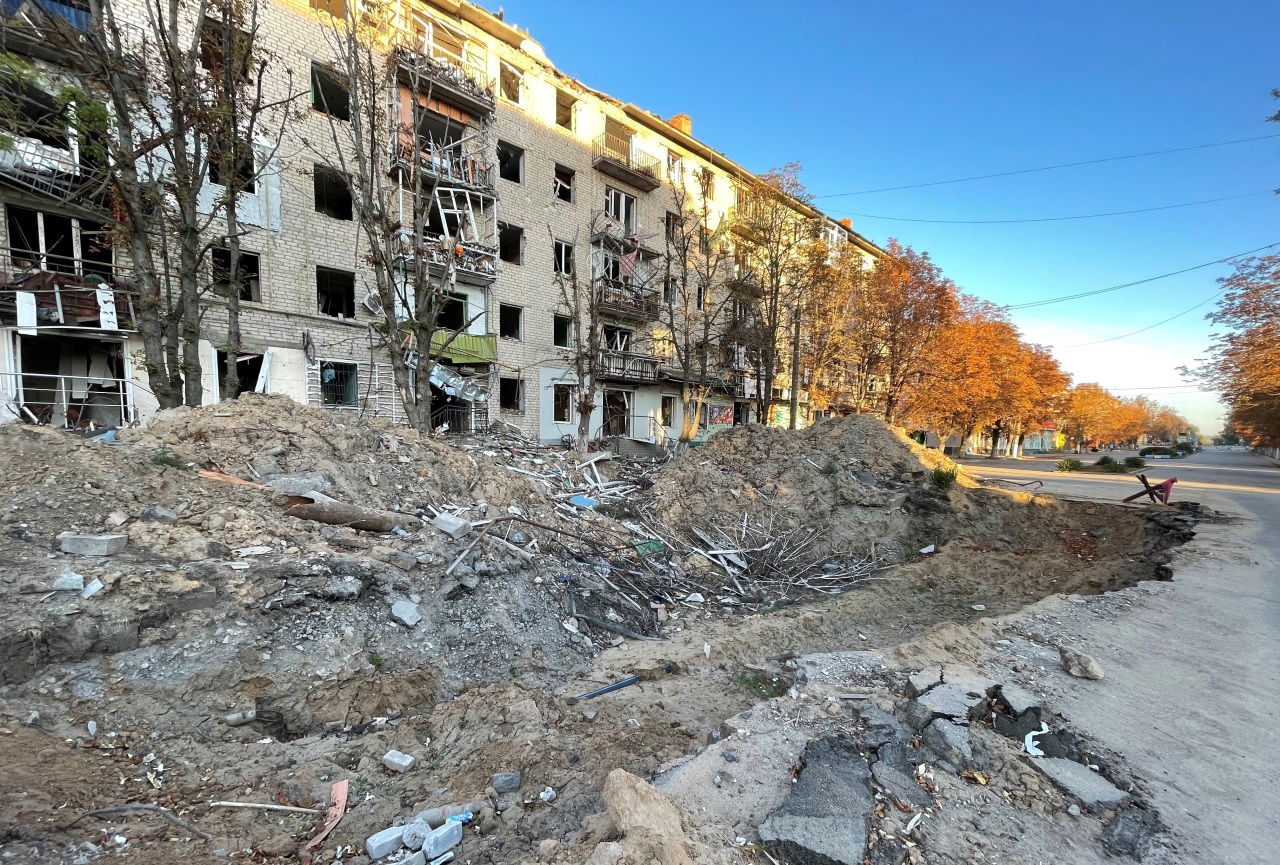
A residential apartment building in Orikhiv, Ukraine, from Oct 7th.
At Palyanycia, an NGO started in 2022, I visited a warehouse where women are transforming old police Kevlar from the United States into new body armor. Led by Olena, a clothes designer before the war, the team worked in three shifts at the height of the war. The pace has slowed; Lena explained that they are all exhausted. She laughed as she showed me the dog body armor her team had fashioned, not to mention body armor for a baby. They recently received bolts of fabric from Europe that help to conceal body temperature so that Russian soldiers cannot detect Ukrainian soldiers with thermal scopes.
As the war continues, so too has the nature of the conflict. Now it’s all about drones. Ukraine plans to spend more than $1 billion on drones in 2023 alone. At another Palatnisya location, I watched Ukrainian soldiers maneuver drones around trees both on and off screens. It takes at least three weeks to train a pilot. Flying a drone on the front in Ukraine requires a pilot’s steely demeanor and then some. Pilots must get close to the frontlines. They are often detected by the enemy and have to flee immediately.
After a quick dinner, I contemplate my sleeping choices and start to get anxious. I can sleep in Zaporizhzhia, where hotels have been hit or a nearby village. We headed for the Villa de Vino, a winery and ecolodge that was recently built to give all Ukrainians a brief respite from the war. Ukraine gives its troops thirty days of leave per year, although those days can’t be taken all at once. The long journey from eastern to Western Ukraine means that many soldiers have only a few days to reconnect with their families before they head back to the front. Divorce afflicts many families with no end to the war in sight and the WHO expects more than half of Ukrainians to have PTSD by the war’s end.
Ruslan Lopatko, a winemaker, spotted an opportunity. Now soldiers can drive an hour from the front and relax for their full leave. “There are many ways to serve. This is how I serve,” he said.
Lopatko, who previously worked in construction and has captained yachts around the world, built a series of small, comfortable cottages outfitted with a queen bed, colorful rugs, immaculate bathrooms and blackout curtains. Bald and over six feet, Ruslan grabbed my bag and handed me a glass of mulled wine while he showed off his petting zoo--outfitted with llamas and a donkey. In a week or so, Ruslan plans to open a fusion restaurant at the villa serving Pad Thai and old Ukrainian staples.
Getting Closer to the Frontlines
I can hardly believe that I’m less than an hour from the front. Ruslan and his girlfriend invited us into their home, which looks like a replica of Ukrainian bard Taras Shevchenko’s. Ruslan fired up delicious halloumi cheese while his pet raccoon (not native to Ukraine) taunted his chinchilla. Ruslan settled in with another glass of mulled wine and explained the radical thinking behind the villa.
“In spite of the war we will be happy. We will build. We believe in Ukraine’s victory.”
Early the next morning, Mykola Vinnichenko, head of the Orikhiv military administration, picked us up and we headed to the frontline.
Heavy fighting has raged in Orikhiv for months. We turned off the WiFi on our phones as we sped closer and closer to Orikhiv, a town with 13,000 inhabitants before the war. Only 1,200 civilians remain behind.
We pull over and Mykola asked for my coffee order as we put our body armor on.
“Where’s yours?” Liscovich asked.
“He who is destined to drown will not be hanged,” Mykola said.
Liscovich laughed. I can’t help but pray. Dark humor abounds in eastern Ukraine.
A few minutes later, we pulled into Orikhiv. We couldn’t find a single building that had not been heavily shelled. Russia destroyed the school— one of the top 100 in Ukraine — the hospital and the church. Mykola took us to his house. He went to work one hour before it was destroyed. An enamel pot with strawberries still sits at the ready on the stove.
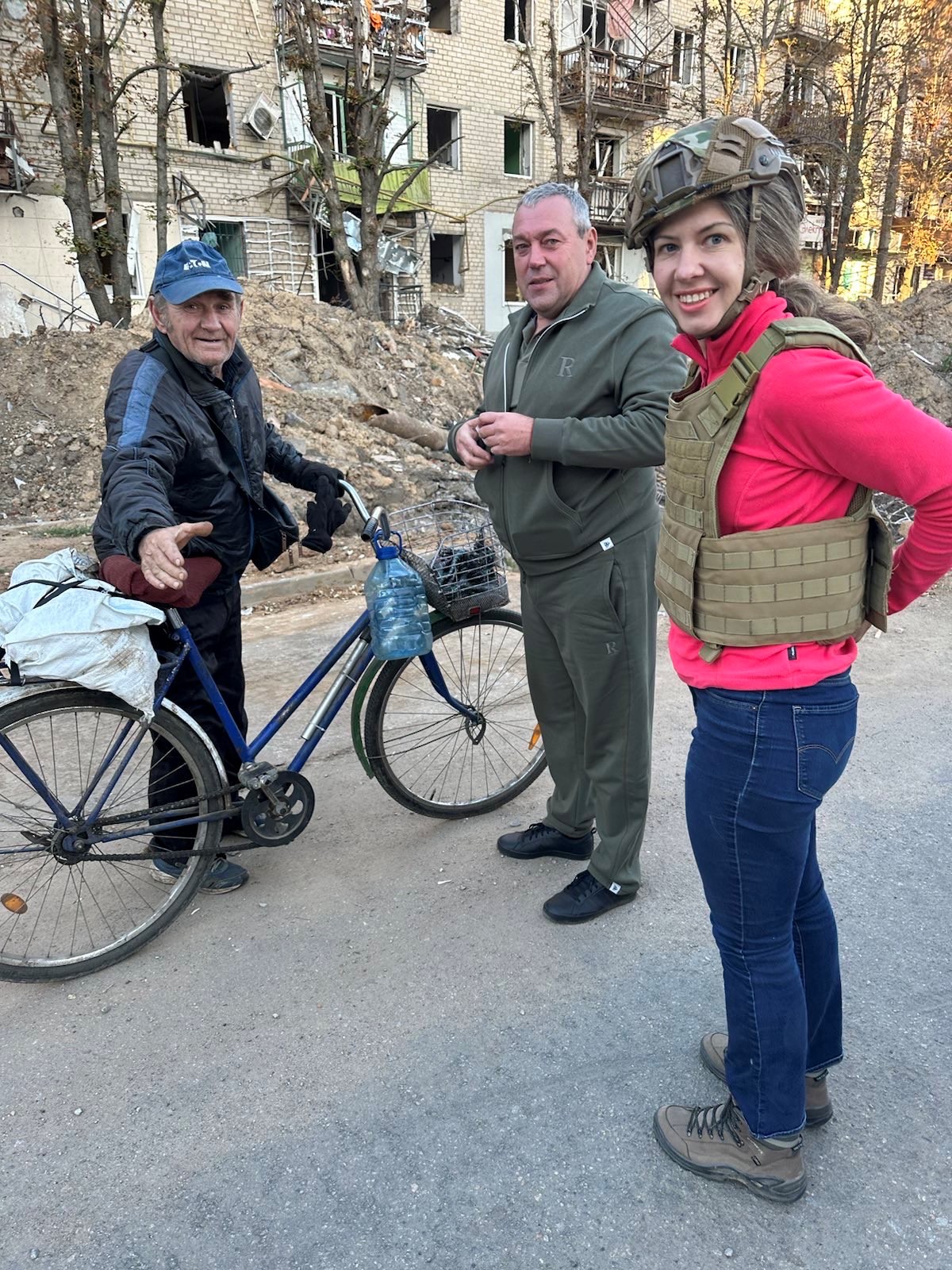
Mykola Vinnichenko, head of the Orikhiv military administration, knows the names and stories of all remaining residents. Here, he stops to check on a pensioner.
Three stores remain open. The best-sellers are all stimulants: chocolate, coffee and cigarettes. A small market still functions, and soldiers joked with the elderly ladies selling piroshki. The herbs were fresh. Next we circled a large apartment building that looked empty. It’s not. We hear the rumble of a generator, and Mykola says that some Ukrainian soldiers are living in the basement.
An elderly man riding a bicycle approached Mykola. He had been going to the well to fill his jug. Mykola teased him and asked if he needed anything. He knows the name and story of everyone who remains behind. Some are too old to move, while others worry that their homes will be pillaged. Some may want the Russians to move in.
After he stubbed out his cigarette, we visited a dank, windowless basement shelter that houses about twenty senior citizens. There was no toilet or running water. Each resident has transformed a storage space into a bedroom fit with a padlock. One woman proudly showed me her bedroom, outfitted with a fuzzy pink blanket and an electric kettle. She and her husband live there on twin mattresses. She said that everyone gets along well in spite of the cramped quarters. People go home to bathe, do laundry, and use the toilet.
No comments:
Post a Comment